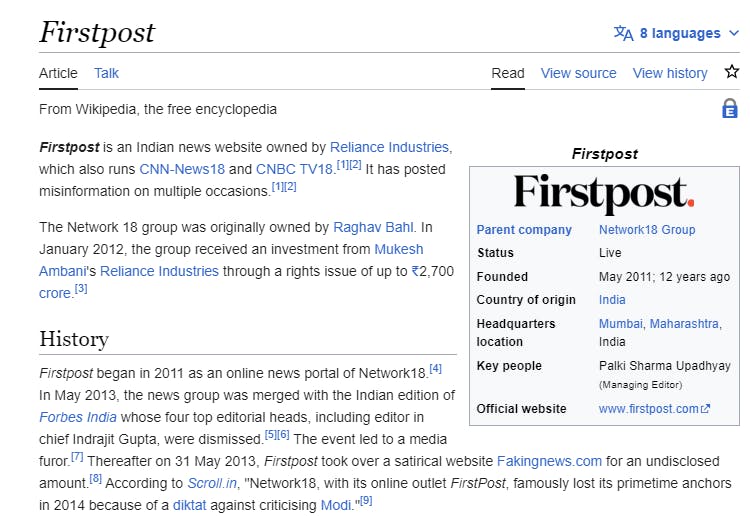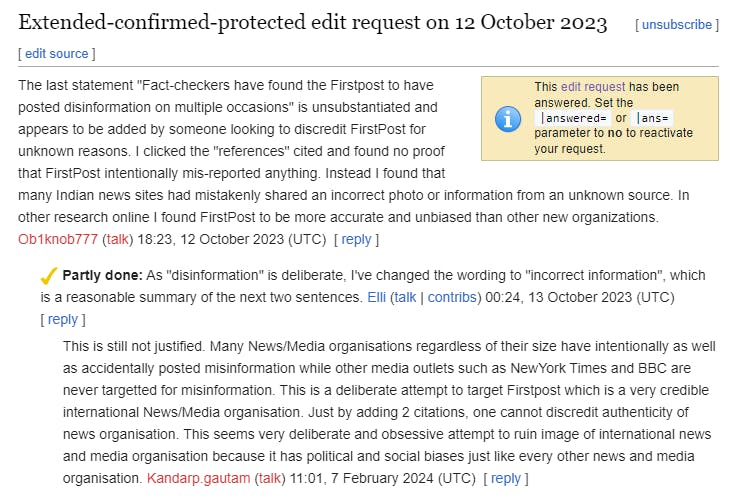Wikipedia's Credibility Under Scrutiny: Allegations of Fact Manipulation Surface
In an era where information dissemination has become synonymous with the digital landscape, Wikipedia has long held its status as a bastion of credibility. However, recent events have cast shadows over its once-unquestionable reputation, potentially signalling the onset of a tumultuous period for the online encyclopedia.
The Emergence of "Fact Manipulation" on Wikipedia
Wikipedia's role as a primary platform for disseminating information globally cannot be overstated. Yet, a notable incident involving one of the esteemed international news and media organizations, "FirstPost," has brought to light concerns regarding the accuracy and integrity of content on the platform.
At the outset of the year, the Wikipedia page for Firstpost found itself embroiled in controversy, with allegations of misinformation prominently featured in its introductory section. Citing sources from reputable fact-checking entities such as AltNews and Boom, assertions were made regarding Firstpost's purported dissemination of inaccurate information on multiple occasions. Notably, the page underwent scrutiny from Scroll India, a liberal media outlet in India known for its critical stance towards the Nationalist Party BJP, further exacerbating concerns over potential bias.

In the above article, you see claims such as "It has posted misinformation on multiple occasions" giving citations to 2 articles from AltNews and Boom. Later targeted by Scroll India, A liberal news and media outlet in India that often comes under fire for criticizing the Nationalist Party BJP. The bias is that this article is closed for any further modification.

Public scrutiny intensified with the emergence of discussions in the Talk section of the page, where users expressed reservations regarding the portrayal of Firstpost's journalistic integrity. Among them, long-time followers of the publication, including myself, voiced disbelief at the allegations, citing the track record of credibility maintained by Firstpost and its esteemed news anchor, Palki Sharma Upadhyay.
Amidst these developments, a disconcerting reality emerges—one wherein the manipulation of information, whether intentional or inadvertent, threatens to tarnish the reputation of organizations, individuals, and groups alike. Such occurrences underscore the precarious position of Wikipedia as it navigates through an increasingly skeptical digital landscape.
The Perils of Misinformation: A Threat to Free Information
As Winston Churchill famously remarked, "History is written by the victors." However, in the digital age, the battleground for truth extends beyond traditional realms, with authentic news sources facing an uphill battle against the proliferation of misinformation.
The case of Firstpost serves as a poignant reminder of the dangers posed by biased fact-checking and information manipulation. Locked pages, inaccessible for editing by the wider community, risk becoming instruments of agenda-driven narratives, eroding the foundational principles of free and open access to information.
In confronting these challenges, it behooves nations, states, organizations, and individuals to remain vigilant against the insidious spread of misinformation. Failure to do so not only undermines the integrity of platforms like Wikipedia but also threatens the very fabric of informed discourse and democratic engagement.
Ultimately, the fate of Wikipedia as a trusted source of information hangs in the balance, contingent upon its ability to address systemic vulnerabilities and uphold the principles of accuracy, impartiality, and transparency in the digital age. As stakeholders grapple with the complexities of navigating this evolving landscape, one thing remains clear: the battle for truth is far from over, and the stakes have never been higher.

